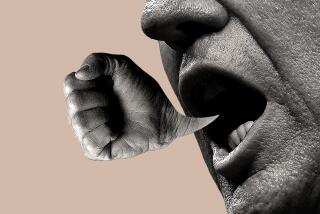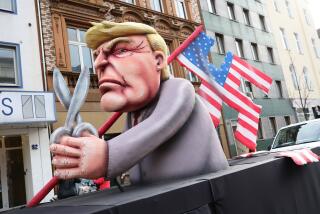Cowboy Style Won’t Lasso Support
- Share via
UNITED NATIONS — President Bush’s much anticipated speech on Iraq this evening is officially billed as an address to the nation. But his words will be carefully weighed far beyond America’s frontiers.
For the president, that could be a problem.
The same folksy style, chin-first body language and no-frills rhetoric he has successfully used to strip down complex issues and reach into America’s emotional heartland for political backing are a turnoff to much of the world outside. And as he searches for new allies abroad as well as backing at the U.N. for a Security Council resolution tough enough to force Saddam Hussein from power, his style frequently works against him.
“It reinforces his image as a cowboy with a loose gun who’s ready to destroy the world,” said Denis Lacorne, a senior associate at the Center for International Studies and Research in Paris. “His language, his style--they don’t help.”
In the aftermath of the Sept. 11 attacks, Bush aimed similar rhetoric at Osama bin Laden and his Al Qaeda terrorist network, vowing to “smoke Osama out and get him running” and likening Bin Laden’s status to that of a 19th century Wild West outlaw: “Wanted, dead or alive.” At that time, however, the United States was riding a groundswell of support internationally, and those abroad realized that with American outrage still white-hot, it was not a time for diplomatic niceties.
“His language after 9/11 was even more colorful than now, but people understood he was angry,” noted a senior U.N. official who asked to remain anonymous. “There was genuine sympathy then, but not now. Now there is skepticism, disdain.”
Though the world may have moved on, much of America has not, and Bush’s words play well in a domestic environment where television’s Fox News features its Iraq coverage under logos such as “Baggin’ Baghdad.”
Indeed, the Senate’s majority leader, Tom Daschle (D-S.D.), predicted Sunday that the Bush administration will receive strong support from both Democrats and Republicans in the chamber for a resolution empowering the United States to go to war with Iraq.
“It will pass, and I suspect that there will be a broad bipartisan coalition in support of it,” Daschle said on NBC-TV’s “Meet the Press.” The margin could be as wide as 75 to 25, he added.
Some powerful Democrats were still holding out. Sen. Edward M. Kennedy (D-Mass.), speaking on CBS-TV’s “Face the Nation,” said he would not back the resolution. “The president hasn’t made the case. A war ought to be the last resort, not the first resort,” he said.
But Daschle, the most senior congressional official to have questioned the resolution, said he was leaning toward supporting what he described as “the first preemptive, unilateral authorization of the use of force” that Congress has ever considered.
Meanwhile, British officials said Foreign Secretary Jack Straw is scheduled to travel to Iran, Jordan, Kuwait and Egypt this week to drum up support in the Muslim world for the U.S.-British position on Iraq.
Yet the Bush persona is problematic even in Britain, America’s only clearly enthusiastic ally on the Iraq issue.
During the summer lull in domestic politics, a period when British commentators were far more intent on criticizing Bush’s style and motives than on measuring the threat from Iraq, polls in Britain turned heavily against a confrontation that could lead to war.
Over the last month, Prime Minister Tony Blair has persistently tried to turn Britain’s national conversation on Iraq away from one revolving around Bush to one focused on Hussein. Early in September, during a news conference in his Sedgefield constituency, Blair said in a miffed tone that he thought “some of the criticism of George Bush is just a parody of the George Bush that I know and work with.”
Said James Naughtie, host of BBC Radio’s “Today” show, which is morning coffee for Britain’s political class: “Blair is very, very aware of the difficulty British people have tuning in to the Bush style. They find that homespun language almost alienating, the simplification of issues which are clearly not. He comes across as someone who can only speak in sound bites from grainy old black-and-white westerns.”
The foreign take on Bush isn’t all negative.
Diplomats at the U.N. still talk approvingly of his speech last month to the General Assembly, where he is widely credited with having laid out a well-argued case against Hussein, noting how the Iraqi leader had defied numerous Security Council resolutions since the 1991 Persian Gulf War and had “attempted to assassinate ... a former American president”--a reference to Bush’s father.
But there was a collective wince here two weeks later when Bush wrapped the case against Hussein in highly personal terms at a Republican fund-raiser in Houston.
“This guy really hates us,” he told the gathering. “After all, this is a guy who tried to kill my dad at one time.”
The use of such down-home language also rekindled long-simmering suspicions abroad that a Bush family vendetta is, at least in part, propelling the world to the brink of war.
“He made a great speech at the United Nations and delivered it effectively, but his default mode plays very badly abroad,” noted David Malone, a former Canadian ambassador to the U.N. “The president’s gunslinging rhetoric, loose rather than precise ... is often counterproductive [overseas], however effective it is domestically.”
Ironically, the two recent American presidents most tarred by domestic scandal are among those most admired by foreigners. Richard Nixon is judged in Europe as a leader who understood the nature of realpolitik like few others, while Bill Clinton is regarded as a brilliant orator and savvy statesman. Last week, Clinton wowed delegates to the annual convention of Blair’s Labor Party with a speech questioning the need for a preemptive strike against Iraq.
President Reagan, though scorned initially in Europe for his Hollywood roots, was seen as a polished speaker and moved easily in the circles of power.
“When he didn’t have anything to say, he shut up,” Malone said.
A number of comments from Bush, exposing gaps in his knowledge of world affairs, haven’t helped his image. He has referred to Greeks as “Grecians” and Africa as a country, lumped together the Serbs and Albanians of Yugoslavia’s Kosovo region as “Kosovians” and shown surprise that a large share of the Brazilian population is black. This year in Tokyo, he described relations with America’s World War II adversary Japan as one of the great enduring alliances, extending back a century and a half.
Faux pas aside, some say they are genuinely mystified by the president’s choice of words.
“It doesn’t make sense,” noted the U.N. official. “If you have a plan to attack Iraq, why do it in a way that alienates everyone?”
Undeterred, Bush last week once again had the United Nations itself in his rhetorical sights, using colorful language and a conservative Republican posture.
“The United Nations must show its backbone,” he said after meeting with congressional leaders at the White House, adding, “We will work with members of the Security Council to put calcium in the backbone so this organization is able more likely to keep the peace as we go down the road.”
Times staff writer Marshall reported from the United Nations and special correspondent Wallace from London. Times staff writer Robin Wright in Washington contributed to this report.
More to Read
Sign up for Essential California
The most important California stories and recommendations in your inbox every morning.
You may occasionally receive promotional content from the Los Angeles Times.










